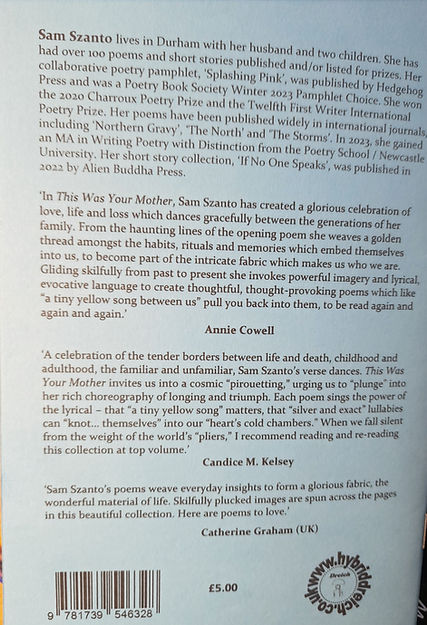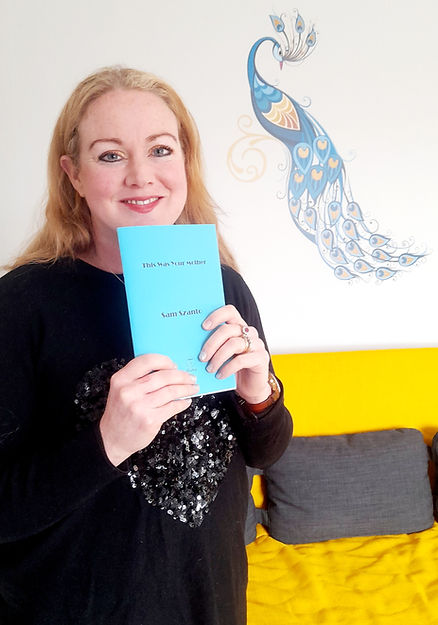Gail Aldwin: 'I’m always delighted when readers see more in the story and characters than I had anticipated'
- samszanto2
- Feb 7, 2024
- 5 min read

A chat with Gail Aldwin about her book, ‘The Secret Life of Carolyn Russell’ (Bloodhound Books, 2023)
If you were asked to describe ‘The Secret Life of Carolyn Russell’ in one sentence, how would you do so?
Thanks for inviting me onboard, Sam. Here goes with a description of the story:
When Stephanie Brett is made redundant, she rediscovers her purpose by developing a true crime podcast into the 1979 disappearance of teenage Carolyn Russell from the school they both attended.
How did the idea for the novel come about?
I began listening to true crime podcasts while living in a remote town in the north west of Uganda and volunteering at a nearby refugee settlement. The power supply was very unreliable and cuts happened most evenings at eight o’clock. With no light to read by, I was often in bed and under my mosquito net around the same time. The nights were long and hot so I spent many hours listening to the podcasts I’d downloaded at a local hotel. I developed a fascination for crime stories from around the world but it was the series podcasts that allowed me to tune into the twists and turns that created crucial listening. One podcast, 'The Teacher’s Pet' acted as really good research in that it covered the case of a missing wife from 1981. Listening to this, I was able to reimagine the norms of the time and give voice to Carolyn Russell.
How is the novel similar or different to what you have written previously?
I’ve written three novels and although the first two were coming-of-age stories, all of my work contains a young voice. I also revisit themes that are important to me including intergenerational friendships and the importance of fresh starts and new beginnings.
The story is a dual narrative, one part taking place in 1979; the other in 2014. What was the reason for choosing those two years?
I wanted to explore changing attitudes and behaviours from the 1970s, including how girls were vulnerable and could be groomed in open sight of their community. There were no DBS checks in schools during those days. For the more contemporary timeline, Stephanie Brett (the redundant journalist who attempts to solve the mystery) is a pioneering podcaster. In 2014, Serial was streamed, the first true crime podcast to be downloaded widely. It seemed appropriate for Stephanie to be investigating a disappearance around the same time.
You evoke the late 1970s wonderfully well. I wonder how much research was needed in order to do so, and how you did this?
I read novels that related to the 1970s like Nick Hornby’s 'High Fidelity' where he retraces his early romances. It was by reading this story that I realised how much language changes over time. His character experiences being chucked where as these days, teenagers refer to the experience as being dumped. Other research involved listening to many episodes of Radio 4’s 'My Teenage Diary' which helped me to develop the teenage logic which drives the narrative.
I don’t think it’s necessary for authors to create characters they like themselves, but I wonder whether you found that you did, in the sense that you would want to be friends with them in real life? And if so, what you liked about them? Similarly, were there any characters that you didn’t like?
I really enjoyed creating the character of Stephanie Brett. Through the experience of developing a podcast, she moves from a lonely existence to one where she has friendships. She’s tenacious and funny. She grows by facing the challenges ahead of her whereas Carolyn Russell remains stuck in a teenage headspace.
I wonder about the decision to put Carolyn’s voice into the first person and Stephanie’s into the third – what was the reason for that?
First person is useful for capturing young voices especially in showing their impetuosity. By presenting alternating chapters in first and third person, it also allows readers to tap into the different voices easily.
Loneliness seems to be a theme of the novel, implicit in the case of Stephanie before Beth moves in and more explicit with Carolyn’s narrative of her school-life. Could you say something about this?
Loneliness makes the characters vulnerable and this creates jeopardy in the novel. Carolyn’s isolation accounts for the unwise decisions she makes whereas Stephanie learns from experience.
Podcasts in relation to mysteries seem to be in vogue as devices in literature/TV at the moment: Lisa Jewell’s recent novel ‘None of This is True’ and the show ‘Only Murders in the Building’, for example. I wonder why you chose to use a podcast in your own novel? What is about them that makes them work as a literary device?
It really started with a fascination for true crime podcasts. Many series podcasts are very well edited so it’s not a linear narrative but includes surprising twists and serendipitous findings. At the time of writing the novel, there weren’t many books that included podcasts but the market has now caught up. In 'The Secret Life of Carolyn Russell' the podcast provides a topical way of linking the two narratives.
You are so adept at creating suspense in the novel, keeping the reader guessing about what has happened to Carolyn right until the end. Do you have any tips for writers on how to create and maintain tension in a novel?
The manuscript went through many drafts and it was by this process that I was able to create a layered plot. I’m afraid I haven’t any shortcuts to share. Each draft brought new ideas which fed into the story.
It’s easy to imagine the novel as a Netflix drama. Can you imagine which actors might play the lead roles? And/or who could direct it?
I recently re-watched a few episodes of Clocking Off which was first screened in 2000. Many of today’s popular actors were at the start of their careers in this series. I’d love to find a role for Philip Glenister or Christopher Eccleston and I think Lesley Sharp or Jo Joyner would make a very good Stephanie. I’d like a trailblazing female director, but I guess it all depends on the budget.

What’s been your favourite reaction to the book?
I love this review from Emily on Goodreads: Absolutely fabulous, bloody well loved it! Would definitely recommend!
Reviews are so important to the success of a book so I’m thrilled when anyone leaves a few words.
Have there been any reactions to the book that have surprised you? Have people seen things in it that you hadn’t seen yourself (until then), for example?
I’ve been invited to attend a few book groups and I’m always delighted when readers see more in the story and characters than I had anticipated. Questions sometimes relate to character motivation and whether their memories are reliable.
What are you working on right now?
Here’s the elevator pitch for my latest manuscript:
At a remote tropical island rich tourists suffer mysterious attacks that are blamed on immigrants from mainland Africa. A woman gets caught up in the conflict only to discover the husband she should be able to trust is the one putting her in danger.
How does that grab you?

Buy ‘The Secret Life of Carolyn Russell’ here: https://www.amazon.co.uk/Secret-Life-Carolyn-Russell-psychological/dp/1504086716










Comments